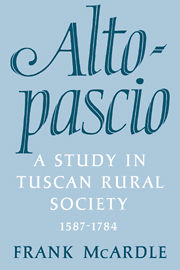Book contents
- Frontmatter
- Contents
- List of illustrations
- List of tables
- Acknowledgments
- Origins
- 1 The estate of Altopascio: village and villagers
- 2 Population
- 3 The economic organization
- 4 The economic performance, part I
- 5 The economic performance, part II
- 6 Familial organization
- 7 Class divisions
- 8 The local authority
- 9 The expression of grievance
- Conclusion
- Bibliography
- Index
8 - The local authority
Published online by Cambridge University Press: 25 October 2009
- Frontmatter
- Contents
- List of illustrations
- List of tables
- Acknowledgments
- Origins
- 1 The estate of Altopascio: village and villagers
- 2 Population
- 3 The economic organization
- 4 The economic performance, part I
- 5 The economic performance, part II
- 6 Familial organization
- 7 Class divisions
- 8 The local authority
- 9 The expression of grievance
- Conclusion
- Bibliography
- Index
Summary
The grand-ducal local representatives, as administrators of his property, had the right to exercise authority over the villagers of Altopascio. The grand duke delegated to the parish priest the duty of maintaining the moral welfare of his subjects and controlling the distribution of alms in the name of the church. The temporal authority to govern the village and to preserve order devolved upon the estate manager. The parish priest and the fattore were the two most important men in the village.
Perhaps no other role in this society is less suitable for generalization than that of the village priest, because the way in which he performed his duties was determined by intimate personal convictions which are unlikely to be recorded. Our task here is to situate the parish priest within the village community and to underline some of his characteristic functions.
The parish of Altopascio imposed its own particular requirements. On the one hand, its considerable charities required a capable and intelligent administrator; on the other hand, this rural parish had little to offer a sophisticated cleric. In an undated letter from the end of the sixteenth century, Senator Giovanbattista Capponi described the task of finding a parish priest in his letter to Signor Piero Usimbardi, the Secretary of Cardinal Ferdinando de’ Medici, the future grand duke.
- Type
- Chapter
- Information
- AltopascioA Study in Tuscan Rural Society, 1587-1784, pp. 182 - 194Publisher: Cambridge University PressPrint publication year: 1978



